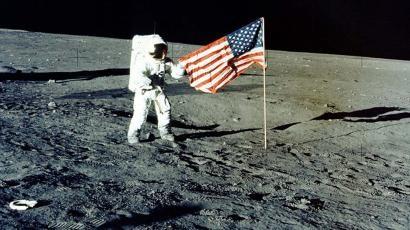Authored by Onar Am via LibertyNation.com,
On July 20, 1969, Apollo 11 took humans to the moon for the first time. Now, 50 years later, an increasing number of people believe that the moon landing was an elaborate hoax.
Some explain this strange conspiracy theory in psychological terms. Being a contrarian can make people feel special, producing a feeling of belonging to a uniquely wise and insightful elite. Others consider it an expression of hatred for America, grasping at any straw that can portray the US in an unfavorable light.
A rarely discussed third reason is the near-religious belief in progress as promoted by the philosophers Georg Wilhelm Friedrich Hegel and Karl Marx, who believed that history inevitably marches toward a better world. But in many areas, we have regressed. NASA no longer is capable of going to the moon, and the last time any human has set foot on our celestial neighbor was in 1972 with the Apollo 17 mission.
If progress is inevitable, why don’t we have hotels on the moon?
For some, it is easier to believe that the moon landing was fake than to accept that technological innovation has just stopped.
The Hiatus In Progress
But wait, don’t we have smartphones now, the internet, and all sorts of cool gadgets and apps that didn’t exist 50 years ago? True, the fields of electronics and telecommunications have seen enormous advances, but these few hotspots of innovation cloak the fact that, in almost all other areas, technological development has ceased. Silicon Valley investor Peter Thiel documented this decline in his book Zero to One, in which he describes several surprising facts:
-
Consider the average car speed. Due to more traffic and congestion, it takes longer to get to work today than it did in 1970. Air travel takes longer, too. We used to have supersonic airplanes, but the Concorde went out of business in 2003.
-
In 1970, a family could afford to buy a house with only one salary. Increasingly this is not true. Health care and education used to be affordable, but the prices keep going up.
-
You have perhaps heard of the growing problem of microbial resistance to antibiotics. Maybe that makes more sense if you also knew that no new antibiotic drug has been developed since the 1960s.
-
Medical innovation also is slowing down. Despite more and more money being invested in drug development, fewer drugs make it to the market, according to Thiel.
Regulations
Why has innovation nearly stopped? The simple answer is likely regulations.
Regulations slow down and prevent innovation by making every endeavor more expensive and less efficient. Today, for instance, it takes on average ten years and $100 million to get a new drug through the FDA approval process. Unlike many other countries, America has spent much of its wealth on financing bureaucrats that make life difficult for inventors. For that reason, the United States is no longer the freest country in the world.
In fact, the Scandinavian countries that Sen. Bernie Sanders (I-VT) often describes as an ideal typically score higher on economic freedom than the United States. A key factor in their success is a lean government with few and more efficient regulations. Despite being large welfare states, it is easier to do business in these countries than in America.
Great Again?
While perhaps not aware of why it was happening, a lot of Americans sensed the slowing of the US economy. That likely is why so many voters responded to President Donald Trump’s 2016 slogan, Make America Great Again.
He promised to slash regulations, and so far the economy has responded with healthy growth and record-low unemployment numbers. The Daily Wire’s new four-episode documentary Apollo 11: What We Saw featuring Bill Whittle describes a time before all those regulations.
Whittle dismantles the fake moon landing conspiracy theory by showing that before Neil Armstrong took that giant leap for mankind, hundreds of small incremental steps had to be made. Each of those steps would have been impossible if draconian health and safety regulations had been in place.
The greatest lesson of Apollo 11 may be that, once upon a time, before the slow and gradual decay into red tape and socialism, America used to be an engine of innovation and growth. Maybe it can be great again?
via ZeroHedge News https://ift.tt/2XXT6x8 Tyler Durden

